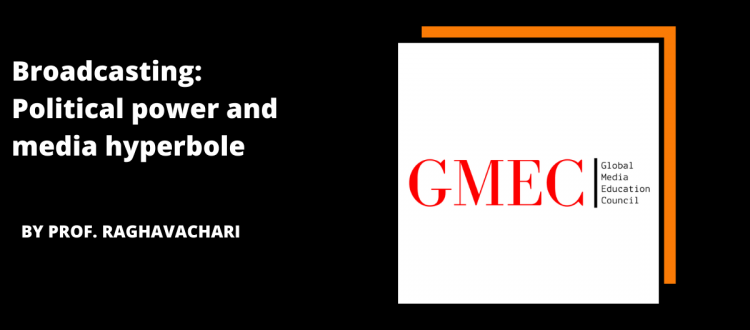Broadcasting: Political power and media hyperbole
Media and media education face humongous challenge with rapidly changing communication technologies, socio-political dynamics complicated by the pandemic situation.
In contemporary eco system television and in particular TV News is rapidly losing credibility and financial viability. Two major issues among many other are its excessive dependence on political and corporate largesse and a mobile revolution which is making huge inroads into its revenues. This is leading to the news channel hyperbole, seriously eroding their credibility.
Politics and media are inseparable. The tremendous expansion and growth of TV News channels and their power happened during the pre Modi era, of weak and coalition governments. The crusading warlords unearthing scam after scam brought down the Congress government. Of course, the decades also saw growing per capita income and media consumption providing financial muscle to the channels
The current trend of political power and control is ever increasing. In such a situation a major question arises about the survival of the broadcasters. When people in government keep a watchful eye on media the survival of media as a crusader for people becomes difficult. Further with the advent and increased reach of mobiles in India has led to content reaching audience faster as compared to traditional media. It has given the audience the power to consume content with the ease of a click and luxury of choosing the time at which they would like to access it hence empowering the audience with both flexibility and diversity.
Media academicians and experts can advise the government and talk about the need for an independent autonomous press. Media in India is self-regulated but there is no authority over it which can question them when they are not behaving responsibly.
These issues are not peculiar to India, it is a global phenomenon in fact everywhere in the world, and including European countries one can find Television media facing the same challenges
No longer has the audience to wait for a particular time to watch news or TV show particularly the younger generation who have shifted to mobiles as a medium. In India there are 1.4 billion people with 600 million people having direct internet access. During the pandemic viewership increased many folds but the advertising has not increased in fact it is declining that’s why one can find there are salary cuts, layoffs and so on in the media industry. Even though they claim their viewership has increased the advertising revenue has definitely moved to the social media. Advertisers have moved to Facebook, Instagram, and YouTube.
India is marching towards 75 years of independence accompanied by the growth of media. Media is totally different today and it’s absolutely unrecognizable in the sense if one looks at the first two three decades of Indian media one will find a very strong political power much stronger than the present Modi government.
People can recall the names of various journalists during that era including, Chalapathi Rao, Prem Bhatia and Frank Moraes. They are remembered as fiercely independent and the government respected them and their mettle.
Chalapathi Rao an eminent Journalist and Editor once said, that if it did not serve the national interest he would not do a story even if the Prime Minister assigned it.
That is the kind of respect the journalists held and were actually advising the government in the development of the nation.
Mrs Gandhi during the emergency pressurised the press and consequently got into a weaker political situation. After this came the era of coalition government.
This is not observed only in India but across the world. Corporate and political powers have now captured the media. Corporates and Political power is heavily influencing media information, direction and its role. If one sees the top few bunches of broadcasters including the India today group both print as well as broadcasting, zee conglomerate and the times now group are much dependent on government advertising and corporate advertising for their revenue. Reuters report says that Indian government has been spending around two to four thousand crores on media advertisement particularly in the election year. This weakens the media as it’s dependency on government and advertisers increases.
The writing on the wall is clear for TV News channels. Stand up together and command respect or lose out into insignificance. High time the doyen of journalism come together to interact with the political power communicate and convince it is in the interest of every one and the nation to have a strong and independent media.
What the lesser mortals in the government and the bureaucracy do not understand Mr. Modi will understand. Long ago another Prime Minister could see clearly credible media will be to the advantage of the political power when the bureaucrats controlling the monopolistic government Radio and TV news could not.
The then all powerful Mrs. Gandhi could see the revolt against her by Assam agitation student leaders who showed black flags and pelted stones at her meeting cannot be blocked out by government media. She acknowledged with respect the story written by the correspondent, when it was shown to her. The story to her horror was rejected earlier by the bureaucrats heading the electronic media. “ Braving a black flag demonstrating agitation she said I will not cow down to pressure, even as a stone hit her she said I am willing to negotiate but not coerced by pressure tactics”.
Mrs. Gandhi understood the power of media then and I am sure Mr. Modi will only understand better. Media need not always be an adversary. It could play an advisory role sometimes. The time is now.

